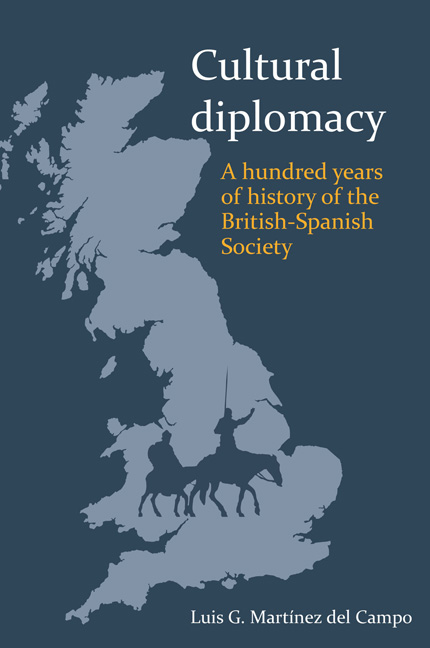Book contents
- Frontmatter
- Contents
- Joint Foreword
- Prologue
- English Edition
- Acknowledgements
- 1 Introduction
- 2 The foundation and expansion of the Anglo-Spanish Society (1916–1920)
- 3 The Anglo-Spanish Society in the interwar period
- 4 The rebirth: The League of Friendship (1950–1958)
- 5 A return to the origins: The new Anglo-Spanish Society
- 6 The Anglo-Spanish Society and Spanish democracy
- 7 Epilogue
- 8 Appendix: Memories of a retired member of the Executive Council of the Society by John Scanlan
- VERSIÓN EN ESPAÑOL
- Nota del autor
- 1 Introducción
- 2 Nacimiento y expansión de la Anglo-Spanish Society (1916–1920)
- 3 La Anglo-Spanish Society en el periodo de entreguerras
- 4 La reorganización: La Liga de la Amistad (1950–1958)
- 5 De vuelta a su origen: La nueva Anglo-Spanish Society
- 6 La Anglo-Spanish Society y la democracia
- 7 Epílogo
- 8 Apéndice: Cuadro de Cargos
- Index – English
- Index – Spanish
2 - The foundation and expansion of the Anglo-Spanish Society (1916–1920)
- Frontmatter
- Contents
- Joint Foreword
- Prologue
- English Edition
- Acknowledgements
- 1 Introduction
- 2 The foundation and expansion of the Anglo-Spanish Society (1916–1920)
- 3 The Anglo-Spanish Society in the interwar period
- 4 The rebirth: The League of Friendship (1950–1958)
- 5 A return to the origins: The new Anglo-Spanish Society
- 6 The Anglo-Spanish Society and Spanish democracy
- 7 Epilogue
- 8 Appendix: Memories of a retired member of the Executive Council of the Society by John Scanlan
- VERSIÓN EN ESPAÑOL
- Nota del autor
- 1 Introducción
- 2 Nacimiento y expansión de la Anglo-Spanish Society (1916–1920)
- 3 La Anglo-Spanish Society en el periodo de entreguerras
- 4 La reorganización: La Liga de la Amistad (1950–1958)
- 5 De vuelta a su origen: La nueva Anglo-Spanish Society
- 6 La Anglo-Spanish Society y la democracia
- 7 Epílogo
- 8 Apéndice: Cuadro de Cargos
- Index – English
- Index – Spanish
Summary
Prior to the 20th Century, British-Spanish relations were determined by many misguided stereotypes, such as the “Black Legend” or the “Pérfida Albión”. These opinions had their beginnings back in the Modern Era, when English and Hispanic monarchies were diametrically opposed to each other, for religious and commercial reasons. Far from being lost in time, these hostile feelings persisted, but eventually coexisting with other more positive images which emerged.
In the 19th Century, various historical events put into question the rivalry of the past and set the scene for greater understanding and even mutual admiration. The outbreak of the Peninsular War and the heroic struggles of the Spanish people against the French occupation had a positive impact on the public opinion of Spain in Great Britain, causing, suddenly, a form of Hispanophilia in Albion (“hispanofilia súbita”) that, according to Moradiellos, provoked a “total revision” of the Black Legend. From then onwards, this dark perception coexisted in Great Britain with other more romantic and attractive images of Spanish people which, however, were still idealistic.
Two other historical events affected perceptions of Spain. The first was initiated with the second restoration of Ferdinand VII to the Spanish throne in 1823, forcing many liberal intellectuals and politicians to seek refuge in London. The cultural and literary activities of these exiles gave Londoners a taste of Spanish culture. The second event was the constant flow of British writers and travellers who visited Spain and returned with romantic descriptions of an exotic country. Among them were Lord Byron (The Girl of Cadiz), George Borrow (The Bible in Spain) and Richard Ford (A Handbook for travellers in Spain and readers at home). In conclusion, the war, the liberal exiles, and the romantic movement produced new stereotypes and, consequently, a different image of Spain in British eyes.
Furthermore, the majority of Spanish colonies in America became independent in the first half of the 19th Century. These Latin American movements for emancipation were supported by Britons, who took advantage of the situation, in order to increase their commercial and political influence over the region.
- Type
- Chapter
- Information
- Cultural DiplomacyA Hundred Years of the British-Spanish Society, pp. 9 - 35Publisher: Liverpool University PressPrint publication year: 2015



